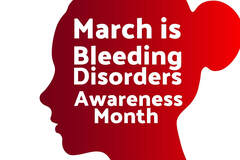Protecting your Eyes with a Bleeding Disorder | National Bleeding Disorders Awareness Month3/1/2020
What are bleeding disorders?Bleeding disorders, such as hemophilia and von Willebrand disease, affect the way the blood clots in the body. When the blood does not clot the way it should, it leads to excess bleeding. Increased bleeding may occur after a minor injury or surgery. Sometimes even a small bump can lead to problems. According to the National Heart, Lung, and Blood Institute, bleeding disorders are uncommon. But when they do occur, they can lead to serious health problems. Bleeding disorders may be acquired, which means they develop at some point in life from another condition. A bleeding disorder can also be inherited, which means it is present since birth. Signs and symptoms of a bleeding disorder may vary, but often include:
If not treated properly, bleeding disorders can lead to complications, such as internal bleeding and damaged joints. Eye and visual effects of bleeding disordersBleeding disorders do not always affect the eyes, but they have the potential to do so. There are several different effects they can have, including: Blood in the white of the eye: Bleeding into the white part of the eye is called a subconjunctival hemorrhage, and it is very common. It involves small blood vessels that burst in the eye. The blood moves into the conjunctiva or the white part of the eye. It does not only occur in people with a bleeding disorder. But if you have a disorder, such as hemophilia, it might occur more often. Abnormal eye position: Although uncommon, heavy bleeding around the eye may move the eye into an abnormal position, such as pushing the eyeball forward. If this occurs, it may interfere with closing the eye properly. Vision loss (rarely): In the most serious cases, significant bleeding behind the eye, which is not stopped, can lead to loss of vision. PrecautionsIf you have a bleeding disorder, it is vital to work closely with your doctor to understand what precautions to take. When it comes to your eye health, consider the following precautions:
Control underlying bleeding disorder Your doctor will determine what the best treatment option is for your condition. Possible treatment includes factor replacement therapy, which is a treatment that involves transfusing donated blood to replace missing clotting factor. If vitamin K deficiency is leading to a bleeding disorder, vitamin K supplements are prescribed. In some cases, medications that suppress the immune system may be recommended if a bleeding disorder developed due to another condition. Treat sudden eye bleeds Bleeding in the eye may occur due to an injury or for no apparent reason in people that have a bleeding disorder. When it does occur, it is important to know how to treat it. If you have hemophilia, your doctor may have instructed you to take factor concentrate to raise your clotting factor. Applying an ice pack to the eye may slow the bleeding down. Also, always call your doctor right away if you develop bleeding in the eye. Get regular eye exams People with various bleeding conditions can still develop eye problems like everyone else, such as cataracts or age-related macular degeneration. Follow your doctor’s recommendations for the frequency of your eye exams. Protect your eyes from an injury Since an injury may lead to significant bleeding, take precautions to prevent eye injuries, including wearing protective eyewear when participating in certain sports. If you or a family member has a bleeding disorder, it is essential to work closely with your doctor and ophthalmologist to prevent eye complications. If you would like to schedule an eye exam with one of our eye doctors, please phone our office at 508-746-8600. Comments are closed.
|
EYE HEALTH BLOGCategories
All
Archives
July 2024
|
|
Kadrmas Eye Care New England
55 Commerce Way, Plymouth, MA 02360
14 Tobey Road, Wareham, MA 02571 133 Falmouth Road (Rt 28), Mashpee, MA 02649 |
Phone Number:
1-508-746-8600 Hours: Monday through Friday — 8 AM – 4:30 PM |


 RSS Feed
RSS Feed
